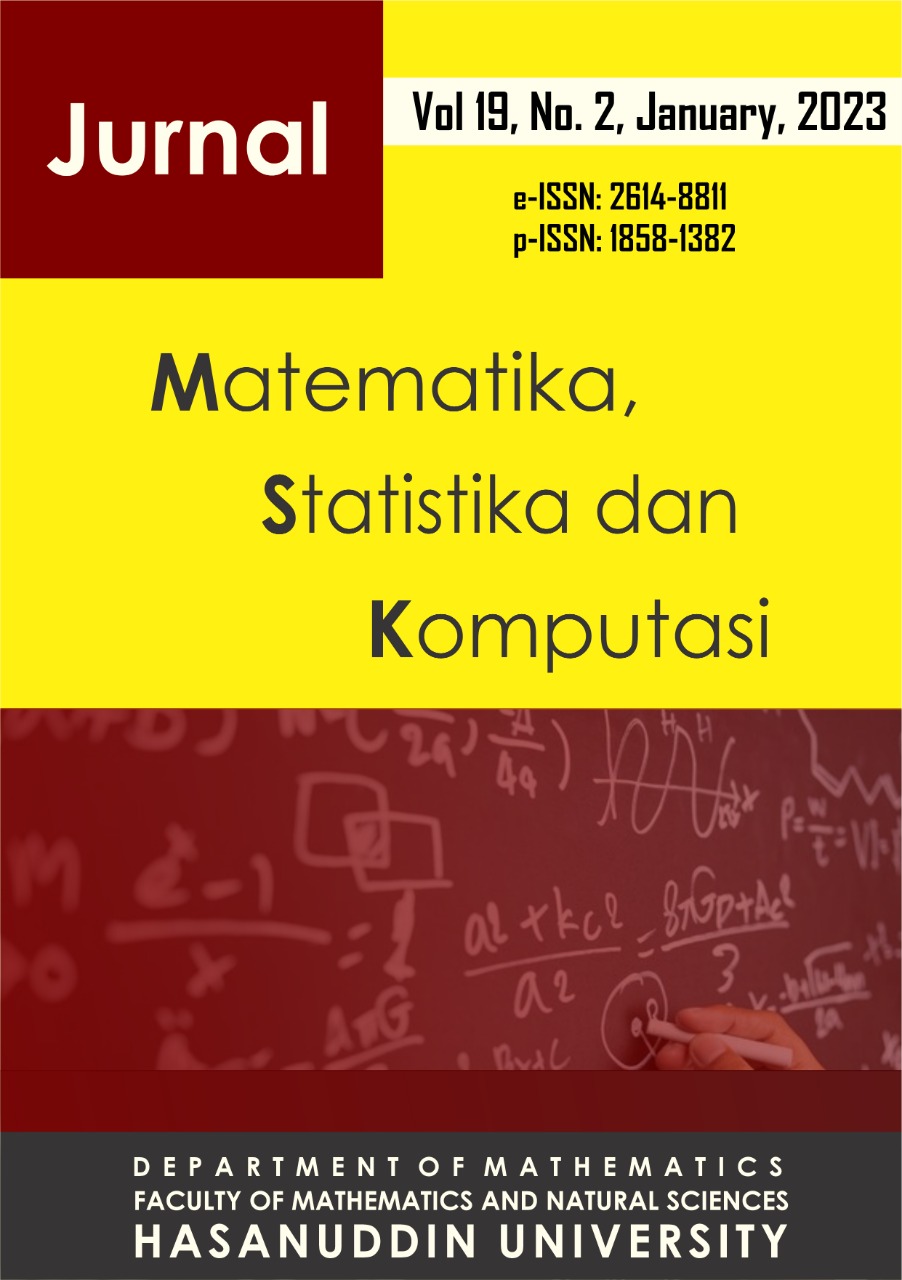Weibull Regression Model on Hospitalization Time Data of COVID-19 Patients at Abdul Wahab Sjahranie Hospital Samarinda
DOI:
https://doi.org/10.20956/j.v19i2.22266Keywords:
Newton-Raphson, Weibull hazard regression model, Weibull survival regression modelAbstract
The Weibull regression model is a Weibull distribution that is directly influenced by covariates. The Weibull regression model discussed in this study was the Weibull survival and the Weibull hazard regression model. The Weibull regression model in this study was applied to the hospitalization time data of COVID-19 patients from May to September 2021 at the RSUD Abdul Wahab Sjahranie Samarinda. The event of the study is recovery of patient. This study aims to obtain Weibull survival and hazard regression model to the hospitalization time data of Covid-19 patients, to obtain the factors that affect the chance of not recovering (survive) and the recovery rate of Covid-19 patients, and also to interpret Weibull survival and hazard regression models based on the obtained model. In this study, the Maximum Likelihood Estimation (MLE) was used as the parameter estimation method. The closed form of the Maximum Likelihood (ML) estimator cannot be found analytically, and the approximation of ML estimator was found using Newton-Raphson iterative method. Based on the test results, the factors that influence the chance of not recovering and the recovery rate of COVID-19 patients were comorbidities history. The chance of not not recovering (survive) for patients who have a history of comorbidities is greater than the chance of not recovering (survive) for patients who have no history of comorbidities. The recovery rate for COVID-19 patients who have a history of comorbidities is 0,5358 times the recovery rate for patients without a history of comorbidities.
References
Bella, A. & Mohamat., 2020. Analisis Survival pada Data Pasien COVID-19 di Kabupaten Jember. BERKALA SAINSTEK. Vol. 8, No. 4, 118-121.
Collett, D. 2003. Modelling Survival Data in Medical Research-Second Edition. New York: Chapman and Hall.
Dinas Kesehatan Provinsi Kalimantan Timur, 2021. PRESS RELEASE COVID-19. Kalimantan Timur: Dinas Kesehatan Provinsi Kalimantan Timur.
Draper, N., & Smith, H. 1992. Analisis Regresi Terapan Edsi Kedua. Jakarta: PT. Gramedia Pustaka Utama.
Herlinda, Y., Suyitno, & Purnamasari, I., 2022. Model Hazard Rate Weibull Kesembuhan Pasien Rawat Inap Penyakit Jantung Koroner di RSUD Abdul Wahab Sjahranie Samarinda. Prosiding Seminar Nasional Matematika, Statistika dan Aplikasinya Terbitan II, e-ISSN:2657-232x.
Hosmer, D.W., Lemeshow,S & May, S., 2008. Applied Survival Analysis: Regression Modelling of Time-to-Event Data. 2nd Edition. New Jersey: John Wilsey & Sons.
Kleinbaum, D.G. & Klein, M., 2005. Survival Analysis: A Self-Learning Text. Third Edition. New York: Springer.
Kundu, S., Chauhan, K., & Mandal, D. 2021. Survival Analysis of Patients with COVID-19 in India by Demographic Factors: Quantitative Study. JMIR. Vol. 5, No. 5, e23251.
Lawless, J. F. 2003. Statistical Models and Methods for Lifetime Data Second Edition. New Jersey: John Wiley & Sons.
Lee, E.T & Wang, J.W., 2003. Statistical Methods for Survival Data Analysis. New Jersey: John Wiley & Sons.
Pawitan, Y. 2001. In All Likelihood Statistical Modelling and Inference Using Likelihood. Sweden: Clarendon Press-Oxford.
Rencher, A.C & Schaalje, G.B., 2008. Linear Models in Statistics. New Jersey: John Wiley & Sons.
Rinne, H., 2009. The Weibull Distribution A Handbook. Germany: CRC Press.
Rodrigues, G.M., Ortega, E.M.M., Cordeiro, G.M., & Vila, R., 2022. An Extended Weibull Regression for Censored Data: Application for COVID-19 in Campinas, Brazil. Mathematics 2022. Vol. 10, 3644.
Sulantari, & Wigid, H., 2020. Analisis Survival Waktu Sembuh Pasien COVID-19 di Kabupaten Banyuwangi. Jurnal Pendidikan Matematika dan Matematika. Vol. 4, No. 2, 375-386.
Suyitno, 2017. Penaksiran Parameter dan Pengujian Hipotesis Model Regresi Weibull Univariat. Jurnal Eksponensial. Vol. 8, No. 2, 179-184.
WHO., 2020. Coronavirus disease 2019 (COVID-19). Situation Report-94. World Health Organization.
Yaseen, H. W & Al Rassam, R. S., 2021. Study of the Factors Affecting the Incidence of COVID-19 Infection Using an Accelerrated Weibull Regression Model. 2021 7th International Conference on Contemporary Information Technology an Mathematics (ICCITM). 322-327.
Downloads
Published
How to Cite
Issue
Section
License
Copyright (c) 2023 Author and publisher

This work is licensed under a Creative Commons Attribution 4.0 International License.

This work is licensed under a Creative Commons Attribution 4.0 International License.
Jurnal Matematika, Statistika dan Komputasi is an Open Access journal, all articles are distributed under the terms of the Creative Commons Attribution License, allowing third parties to copy and redistribute the material in any medium or format, transform, and build upon the material, provided the original work is properly cited and states its license. This license allows authors and readers to use all articles, data sets, graphics and appendices in data mining applications, search engines, web sites, blogs and other platforms by providing appropriate reference.







